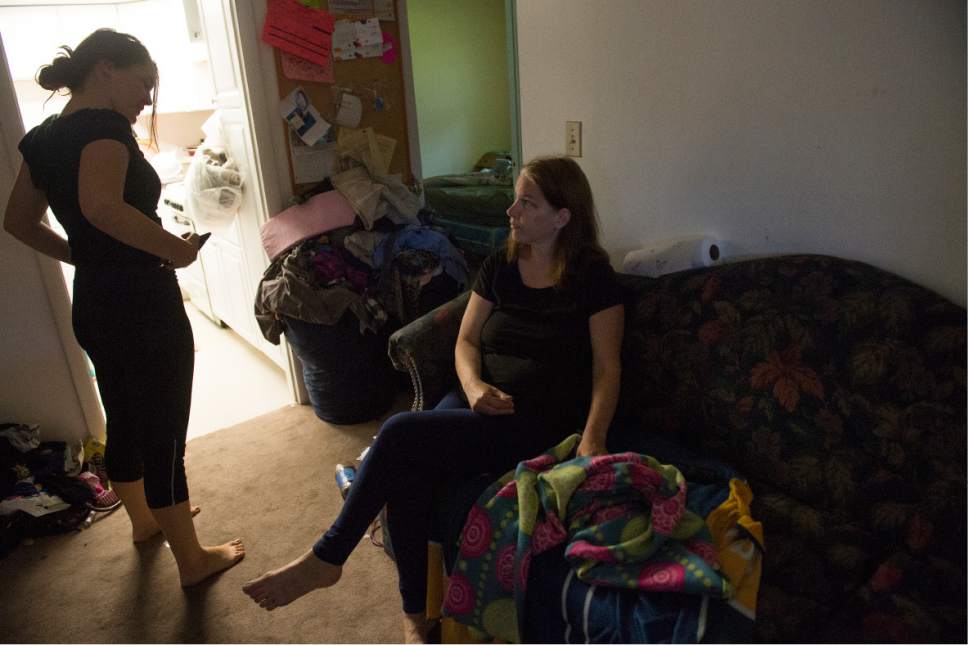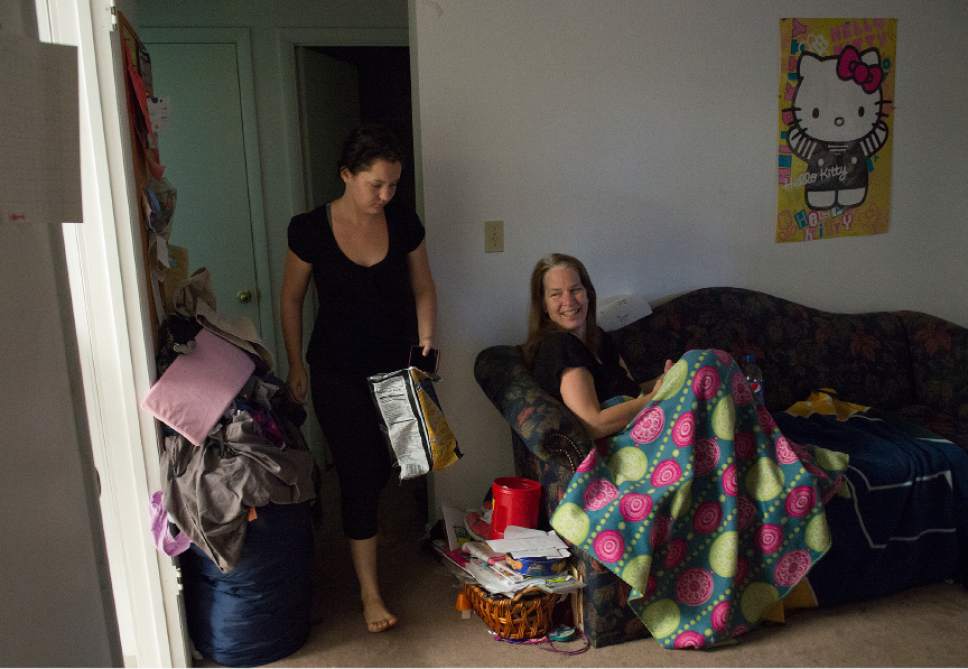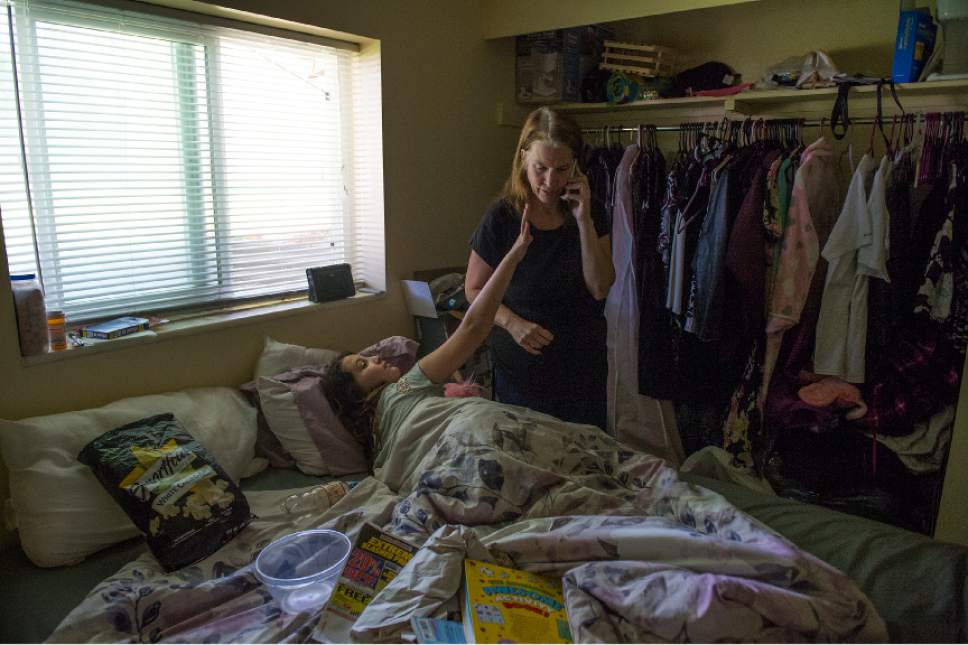This is an archived article that was published on sltrib.com in 2016, and information in the article may be outdated. It is provided only for personal research purposes and may not be reprinted.
Taylorsville • Kimberly Gross and her two daughters live in an "illegal" duplex they leased through a Road Home "rapid rehousing" program funded through the federal Department of Housing and Urban Development (HUD).
It is listed by the Salt Lake County assessor as a single-family dwelling.
Her cramped basement unit has no address, no mailbox and can be entered only through the garage. The utilities for the upstairs and downstairs are not separate. The renters upstairs pay the electricity bill, and Gross pays the gas bill.
The rapid-rehousing program typically pays a deposit and the first three months' rent — but no utilities. It also provides a case manager to help clients get needed services as they move toward self-sufficiency.
The program is seen as successful because most participants do not return to the shelter, said Matt Minkevitch, executive director of The Road Home.
The Salt Lake Tribune recently reported on Salt Lake City Councilman Derek Kitchen's discovery of poor living conditions in one constituent's apartment obtained through the program, and another participant's complaints to the newspaper about a bug-infested unit from which she was evicted. The newspaper also described the travails of Amy Tabor, a single mother who was evicted from a rapid-rehousing apartment and slapped with a bill for thousands in penalties and attorney fees.
The Road Home believes those are anomalies and says rapid rehousing helps hundreds of people each year escape homelessness.
Since Gross moved into her basement unit last October, the 46-year-old mother has paid to heat the entire house, as well as the water for the family upstairs. Pro-rated over a 12-month equal payment plan, Gross must come up with $96 per month for the utility on top of the $750 rent.
Gross and her daughters have no control of room temperature — the thermostat is located upstairs. "In the winter, we sweat," she said. "In the summer we freeze. It's annoying."
Not least, the upstairs tenant is not locked out of her basement apartment.
When Gross and her daughters moved in last fall, they didn't receive any mail for months — the renters upstairs did not realize they shared an address.
The Salt Lake County assessor lists the property near 5000 South and 2500 West as a single-family residence.
This Taylorsville subdivision is zoned only for single-family houses, said Mark McGrath, community development director.
No conditional-use permit has been issued for the residence to be rented as a duplex. "It's definitely illegal," McGrath said.
The house is owned by Banded Properties, a West Bountiful company owned by Matt Oviatt, according to county and state records.
Oviatt did not return calls from The Tribune regarding this story.
Gross was steered to the property last fall by The Road Home. She shares the two-bedroom apartment with daughters Petrina Westman, 14, and Destiny Westman, 10. It has low ceilings, a tiny kitchen and few windows.
The trio was desperate to get out of the homeless shelter, Gross said, and the small, dark apartment seemed like a better place.
"It was the only place we could get," she said. "So I took it."
Since then, she said, she has received little assistance from her rapid-rehousing case manager.
Gross realized after she signed a one-year lease that the apartment was "illegal" when the cable company refused to provide service because there already was a customer at that address.
The unit isn't what one might expect when listening to homeless advocates and service providers praise rapid rehousing.
The Road Home seeks out landlords for the rapid-rehousing program, according to Celeste Eggert, director of development.
"Our team actively identifies and cultivates landlords to encourage them to work with our families and our agency," she said in an email.
Under HUD regulations, each potential rapid-rehousing unit must be inspected before it can be leased with federal funds.
The Road Home makes such inspections, Minkevitch said.
Nonetheless, it's difficult to see how Gross' apartment could meet minimum standards.
Until recently, Gross was employed. But her medical condition forced her to take a hiatus. She has Crohn's disease, a chronic inflammation of the digestive tract. She also is seeing a liver and kidney specialist, as well as a cardiologist. Lately, she has been fainting.
The family has no car and Gross must walk 15 minutes to a bus stop. She then must transfer to TRAX for treatment at University Hospital.
Without an income, Gross fears her family could be evicted and wind up back in the homeless shelter.
Times are hard, particularly for her daughters, who, Gross said, suffer from depression and anxiety.
"It's overwhelming for them," she said. "I've warned them, I don't know how much longer I'm going to be around."
Rapid rehousing is being emphasized by HUD over "transitional" housing that provides more support and programming, said Washington, D.C., agency spokesman Brian Sullivan.
"Rapid rehousing is designed to assist people who don't need a tremendous amount of support," he said. "Rapid rehousing is seen as permanent housing, even though it's temporary."







